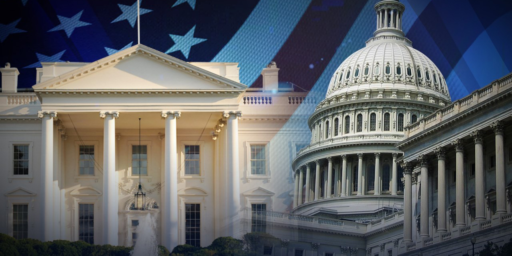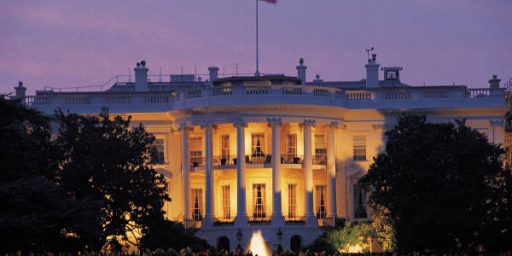State Secrets Privilege
Henry Lanman has a disturbing look at the “state secrets” privilege in Slate today.
Never heard of the “state secrets” privilege? You’re not alone. But the Bush administration sure has. Before Sept. 11, this obscure privilege was invoked only rarely. Since then, the administration has dramatically increased its use. According to the Washington Post, the Reporters’ Committee for Freedom of the Press reported that while the government asserted the privilege approximately 55 times in total between 1954 (the privilege was first recognized in 1953) and 2001, it’s asserted it 23 times in the four years after Sept. 11. For an administration as obsessed with secrecy as this one is, the privilege is simply proving to be too powerful a tool to pass up.
There is nothing inherently objectionable about the state secrets privilege. It recognizes the reasonable proposition that even simple lawsuits against the government—tort suits, breach of contract claims—can sometimes involve issues that would be genuinely harmful to national security if they saw the light of day. Say, for instance, that a janitor in Los Alamos, N.M., tripped over a box of uranium lying in the hallway in 1943. It would hardly do to have the evidence used in the subsequent slip-and-fall case scuttle the entire Manhattan Project. So, tough though it is on individual plaintiffs, the courts have historically deferred to government claims that some evidence in certain litigation must be shielded as “state secrets.”
[…]
In addition to the fact that the government is using what was once largely an evidentiary privilege to dismiss entire lawsuits, the administration’s sweeping use of the Reynolds privilege is disturbing because it’s also using it to dismiss even those lawsuits in which the underlying facts have already received substantial publicity.
[…]
Despite the burgeoning use of this privilege and the way it’s been used to gut entire cases, the most disturbing aspect of the Bush administration’s expansion of the state secrets privilege may well be this: More and more, it is invoked not in response to run-of-the-mill government negligence cases but in response to allegations of criminal conduct on the part of the government. These are not slip-and-fall cases. They are challenges to the administration’s broad new theories of unchecked executive power. By using the state secrets privilege to shut down whole lawsuits that would examine government actions before the cases even get under way, the administration avoids having to give a legal account of its behavior. And if this tactic persists—if the administration continues to broadly assert this privilege and courts continue to accept it—the administration will have succeeded in creating an insurmountable immunity that can be invoked against pretty much any legal claim that the “war on terror” violates the law. The standard and winning response to any plaintiff who asserted such charges would be, quite simply, that it’s a secret.
The privilege is indeed something that could be easily abused. Most problematic of all is that there is no way for ordinary citizens, including those of us with a significant acquaintaince with the nature of classified information, to know when abuse is occuring. Cases (like the AT&T/NSA example cited by Lanman) that look fishy on the surface could well be founded on information truly vital to the security of the nation; those that seem legit may well be truly sinister abuses of power by an administration covering its own backside. It’s the classic Catch-22: the only way we’d know is if the secrets were revealed.
The obvious solution to this problem, envisioned by the Framers, is the checks and balances system. The problem is that the Judiciary has almost always been very squeamish–and rightfully so–of intervening in matters where the Executive claims “national security” and the Legislature has become such a partisan body that acquiescence to the administration is expected from that party and malfeasance is immediately charged by the “out” party. The result of which is that the Congress is not deemed trustworthy of state secrets by an Executive that has long abrograted to itself a right to decide what it will trust the Legislature with. That, most obviously, was not the way the Constitution was drawn up.






‘Where the Executive claims “national security”‘. You say it like it’s not true, liberal James.
And what in the heck is Slate talking about? Since 1954 we have never had a war like the war on terror. 23 times does not seem excessive at all.
You liberals are amazing. You see abuse of power where there is none, excessive force in justifiable retaliation, and lies where there is only justice.
God help us if the liberals would have been in charge after 9/11. God help us if they take the presidency in 2008 and then we are again attacked. God help the world in their response, which will be predictably nuetered.
Ahhh freedom. It was great while it lasted.
James, I have detected a recent shift in your posts. You are much more skeptical of the administration’s policies as of late. Keep up the good work!
Christopher, you might want to check your old history books back out. The entire reason the United States exists is because of the unchecked abuse of executive power. Taxation without representation; life, liberty & the pursuit of happiness; all men are created equal – you know the stuff.
We should know, from our own nation’s experience, that power must never go unquestioned. Authority must always be balanced with responsibility. And a government that makes its inner workings a secret from its own people is a dictatorship, not a democracy.
You cowardly little f*ck. You and everyone else who throws around the specter of terrorism, as though it was something invented in 2001, and is more dangerous than any threat we’ve ever faced, and is therefore reason enough to sacrifice everything we’ve built, make me sick.
If you want to live in a fascist police state that tells you what your ‘freedoms’ and ‘rights’ are, go someplace else. I’ll not let you build one here.
Chill, Legion.
I get a ‘lil cranky when I post before I finish my coffee… 🙂
Gee legion, you are the one who thinks it is so bad. Why don’t YOU leave?
Chris is right when he says we’ve never had a war like the war on terror, legion. It’s true, never before have we gone to war with a noun. Nor have we ever run so scared from a group of banditis. And who’d have thought we’d so willingly clamor to give up our freedom to a dictatorial cabal on a flimsy promise of protection despite repeated examples of the cabal’s incompetence in any case?
What has happened to the nation that showed such courage 230 years ago in facing the world’s greatest super power when we were the equivalent of a third world power today? What has happened to the nation that took on and defeated an incredibly powerful fascist axis that had overwhelmed over a quarter of the world 60 years ago. What has happened to the nation that withstood the threat of absolute nuclear obliteration for 40 years without sacrificing its freedoms in the process?
Have we become a nation of Christophers?
LOL I hope so!